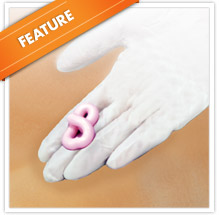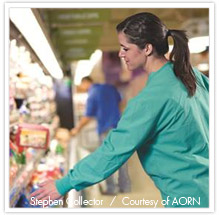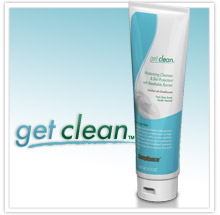
| Cleanse, Moisturize and Protect The three steps to perineal skin care | |
 |
Delicate skin is a delicate subject - but the proper care of perineal skin can greatly increase the comfort, dignity and health of your incontinent residents. According to the Centers for Medicare & Medicaid Services (CMS), skin problems related to incontinence and moisture can range from irritation to an increased risk of skin breakdown.1 If perineal skin is exposed to urine or stool for prolonged periods of time, incontinence-associated dermatitis (IAD) can begin to develop.2 One of the keys to preventing breakdown and its complications is to keep perineal skin clean, moisturized and protected. According to Tag F-315 of the State Operations Manual, research has shown that a soap and water cleansing regimen (which can dry the skin) might be less effective in preventing skin breakdown than a routine that includes no-rinse incontinence cleansers and moisture barriers. Moisturizers help to preserve skin’s moisture by either adding moisture or sealing in moisture that is already there.1 |
|
To save time and increase efficiency, your facility might consider selecting a product that performs multiple steps, such as a no-rinse cleanser that also contains moisturizers and dimethicone to protect the skin. Barrier creams, such as those that contain dimethicone or zinc, are ideal for residents who have significant urinary incontinence as well as those with fecal or double incontinence (both urinary and fecal). REFERENCES
|
| More Than Half of Healthcare Workers' Uniforms Could Be Hosting Bacteria | |
 |
Here's some icky news - even though they might look clean, more than 60 percent of healthcare workers' uniforms examined in a recent study tested positive for pathogens, including those that cause MRSA, bloodstream infections and pneumonia. The germs were collected from the sleeves, waists and pockets of uniforms. The findings led researchers to the conclusion that scrubs and uniforms could possibly transmit germs to the individuals under a facility’s care. They also believe that the germs on uniforms could reflect poor handwashing practices. In light of their findings, the researchers recommend that healthcare workers change into clean uniforms daily, improve their hand hygiene practices and don plastic aprons for messy jobs that could involve splashing or contact with body fluids. To learn more, click here. |
 |
Compliance® Moisturizing Cleanser & Skin Protectant with Breathable Barrier Use our gentle wash cream to freshen skin and help prevent perineal rash. It leaves behind a protective layer to help seal out wetness and has a fresh, clean, gender-neutral scent. Enriched with dimethicone, it is ideal for frequent cleansing and incontinence care. Additional Features:
|
|
Product pricing is only visible to registered promedsupply.com customers. If you are not yet registered, one of our Customer Care Professionals will be happy to get you set up. Just give us a call at (800) 648-5190. | |
 |
 |
